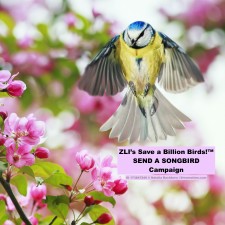After the Pandemic: Internationalist Wildlife Conservation Initiative

NEW YORK, April 15, 2020 (Newswire.com) - The Zoological Lighting Institute™ Save a Billion Birds!™ campaign announced plans to offset expected devastation to wildlife, resulting from financial pressures stemming from the COVID-19 pandemic. By sending songbirds otherwise killed in the United States and other developed regions back to migratory habitats in the southern hemisphere, ZLI will work to offset and delay further zoonotic diseases while protecting the substantial financial and economic value (estimated in the trillions of dollars – see links below) that wildlife provides.
More migratory birds are killed in the US than anywhere else on their migratory routes, but the challenge stems from a typical relationship between developed countries in the northern hemisphere, versus biodiversity-rich countries in the south. Building glass and degradation of natural lighting in the north, have had a greater toll on wild migratory birds than even logging and deforestation, although both are crucial challenges to be overcome. (https://news.cornell.edu/stories/2018/09/more-4-billion-birds-stream-overhead-during-fall-migration). The ZLI Save a Billion Birds! 'Send a Songbird' Program, aims to keep birds alive in the north through coordinated planning services, research funding and educational programs, working in conjunction with accredited zoos and aquariums to do so.
“We take our cue from UNEP (United Nations Environmental Program) and the CBD (Convention on Biological Diversity),” offers ZLI Executive Director James Karl Fischer. “This is an international challenge requiring international solutions. In times of financial stress, people without substantial resources turn to nature for sustenance. Hunting, fishing, agriculture; all of these provide food from nature when none is available to be had from industrialized sources. But if wild populations aren’t managed, individuals can do more harm than good. No one is as disconnected from this as we like to imagine.”
Dr. Fischer continues …“People in the northern hemisphere are connected to global wildlife more than they realize. Many migratory birds that we see in our cities, backyards and parks are the same that help to sustain southern biodiversity hot-spots. Losing these birds makes it impossible for biodiversity hot-spots to recover from improper resource-acquisition damage, which becomes more severe when the global economy is at a standstill.”
ZLI’s Save a Billion Birds! 'Send a Songbird' Planning is available to private, corporate and institutional stakeholders: https://zoolighting.org/subdepartment/zli-wildlife-friendly-design. An upcoming documentary film ‘Save a Billion Birds!’ describes the need and process of bird-friendly planning, and begins shooting in California and Chile, (in conjunction with coordinated versions from South Africa to the UK and Thailand to South Korea) as investments and sponsorships are secured. For more information about ZLI’s Save a Billion Birds!™ campaign, and how to engage the charity to ensure that development mitigates biodiversity-loss, please ask to speak with one of ZLI’s Save a Billion Birds! Campaign Committee Leaders directly through saveabillionbirds@zoolighting.org.
References and Resources:
https://www.zoolighting.org
https://www.unenvironment.org/news-and-stories/video/message-nature-coronavirus
https://www.cbd.int/financial/values/unitedkingdom-valueliterature.pdf
https://news.cornell.edu/stories/2018/09/more-4-billion-birds-stream-overhead-during-fall-migration
https://science.sciencemag.org/content/366/6461/120
https://www.muhlenberg.edu/academics/biology/faculty/klem/aco/Bird-window.html
https://www.3billionbirds.org
https://www.birds.cornell.edu/home/bring-birds-back
https://www.weforum.org/agenda/2018/10/this-is-why-putting-a-price-on-the-value-of-nature-could-help-the-environment
Contact: Stephen Villante, ZLI Communications Director
Phone: 01.212.317.2927
Email: saveabillionbirds@zoolighting.org, admin@zoolighting.org
#####
Source: The Zoological Lighting Institute